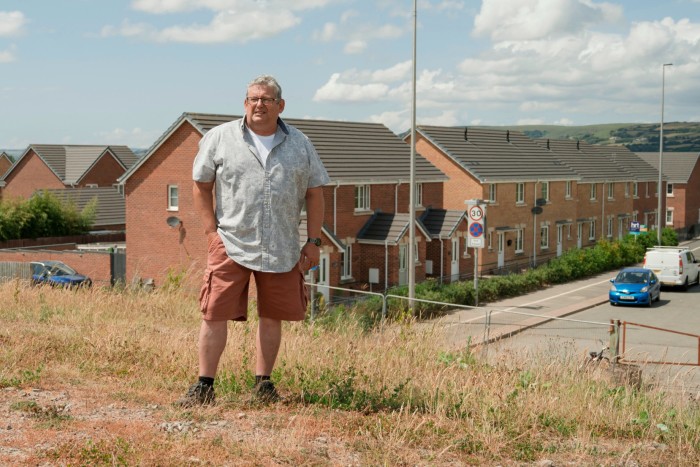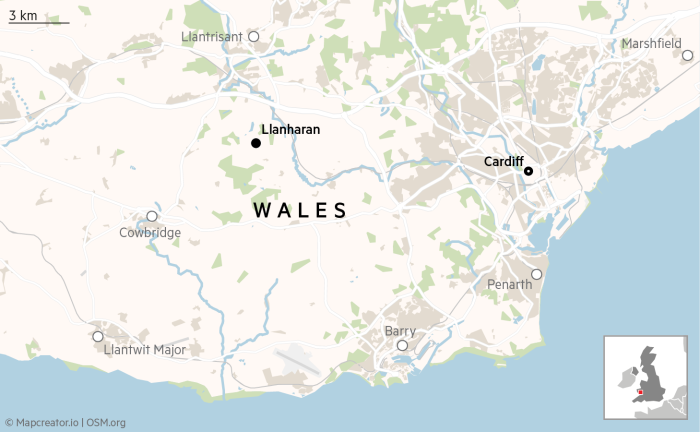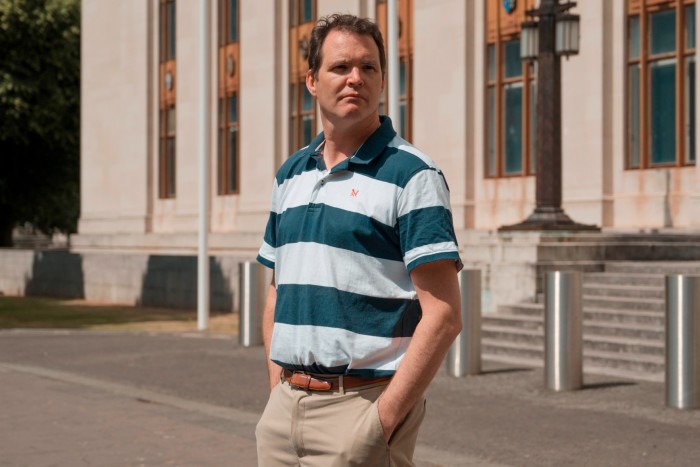At the edge of the St Ilid’s Meadow housing development, in Llanharan, south Wales, two traffic signs inform drivers the national speed limit is in force. But, just beyond, the road ends abruptly at a gate and gives way to scrubland overgrowing an old opencast coal mine.
The dead end is one of several around the town that testify to how developers had for years anticipated connecting those roads to a new high-speed bypass as part of plans to add 1,850 homes to the area. Many locals were supportive, believing the new arterial network would relieve pressure on the cramped, Victorian high street that runs through the town, 15 miles west of Cardiff.
Yet on February 14 this year, the Llanharan bypass was one of 31 road-building projects in Wales cancelled by the devolved government in Cardiff. The Labour-run administration said it was no longer appropriate, given its decarbonisation targets, to authorise any new roads that provide greater capacity for private car journeys or allow increased vehicle speeds.
The Welsh arm of the Friends of the Earth environmental campaign group has hailed the move, which gave the go-ahead to just 17 projects, as “world-leading”.
The controversial decision has caused an outcry in some Welsh communities that have lost their new roads, which they insist are needed to address their acute transport problems.

Neil Feist, a Liberal Democrat member of Llanharan, community council, expressed the widely felt frustration. “The whole thing has just reached a tipping point,” he said. “All these new commuter houses are still going to be built — but no bypass.”
But speaking at the Welsh government offices in Cardiff, Lee Waters, Wales’s deputy climate change minister, in charge of transport policy, told the Financial Times there was no turning back. “I care more about tackling climate change than winning my seat,” he said. “The nature and the severity of the threat are existential.”
He said drastic action was vital. Greenhouse gas emissions from transport in Wales fell only 6.3 per cent between 1990 and 2019, the last year before coronavirus disruption, compared with a cut of 35 per cent from both electricity generation and industry, he added.
“Unless someone is prepared to pull the handbrake on this, we’re never going to match our rhetoric with our actions,” Waters said. He added there was “huge cognitive dissonance” in Wales around the country’s commitment to reach annual net zero carbon emissions by 2035.

“Everyone signed up for the high-level targets,” Waters said. “As soon as we shift from the general to the particular, people run a mile. People concurrently want us to get to net zero by 2035 but they want us to continue building rural bypasses.”
The key questions this bold experiment must answer are whether it is the best way to cut carbon emissions from transport and if the economic price is worth paying.
The cancellation of the 31 projects was based on the argument that building more road capacity merely encourages more car journeys. Studies have shown that some projects have resulted in the same congestion levels that prompted the expansion in the first place.
Waters said the UK’s other devolved administrations — in Scotland and Northern Ireland — were watching closely and that the initiative had also attracted interest from Sweden and Spain.

In late June, the Climate Change Committee, the UK government’s independent adviser, recommended the Westminster administration undertake a similar review of its road-building programme for England.
The UK government said the growing take up of electric vehicles meant it was “on a clear path to net zero” despite its plans to continue road building. “Our road investment strategy is designed for all vehicles including greener cars, buses, vans and [heavy goods vehicles],” it added.
But Waters pointed out that the CCC had said a switch to electric vehicles was a “necessary but not sufficient” step towards net zero. The committee has said that increased use of cycling, walking and public transport — which Waters’ policies aim to encourage — can cut emissions more quickly and cost-effectively.
“The UK Climate Change Committee makes it clear . . . that we do need to decarbonise our cars but that’s not going to be enough to hit the very steep, stretching targets we have,” Waters said.
However, Natasha Asghar, the Conservative shadow transport minister in the Welsh assembly, dismissed the Labour government’s road policies, which include a default 20mph speed limit in urban areas, as “ludicrous”, adding: “We don’t have a strong economy to make these radical changes.”

Stephen Glaister, emeritus professor of transport and infrastructure at Imperial College, was also critical of the approach in Wales, dubbing it a “back-to-front policy”. He added: “To try to reduce traffic by not providing the capacity is likely to be counter-productive . . . You’re likely to produce congestion.”
Waters acknowledged the disquiet in the communities that had lost out. Further north in Llanbedr, on the Welsh coast, locals blocked the road through the village in protest at the cancellation of a planned bypass earlier this year.
“All of a sudden, we’re taking away from them without giving them a copper-bottomed guarantee of an alternative,” Waters said, adding the “big challenge” was to deliver alternatives to car travel quickly enough to reassure residents. “Managing that is a challenge because money is short and these things take a long time.”
Feist said that was a problem for Llanharan as it had little provision to encourage walking or cycling and the train service was “erratic”.
David Evans, Llanharan’s representative on Rhondda Cynon Taff council and a political independent, said the only answer was the resurrection of the bypass proposals or condemn the town to years of traffic jams and air pollution. “It’s something that’s needed,” he said. “It’s really as simple as that.”
There may yet be a compromise, according to Huw Irranca-Davies, the Labour member of the Welsh parliament for the Llanharan area. He pointed to the government’s recent promise to the people of Llanbedr to consider a relief road that runs at much slower speeds than a traditional bypass.
“We have a real opportunity here in Llanharan to think about how we don’t just build roads but we build lovely, pleasant, desirable communities,” Irranca-Davies said.